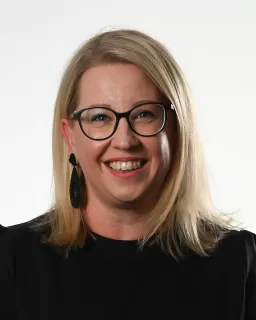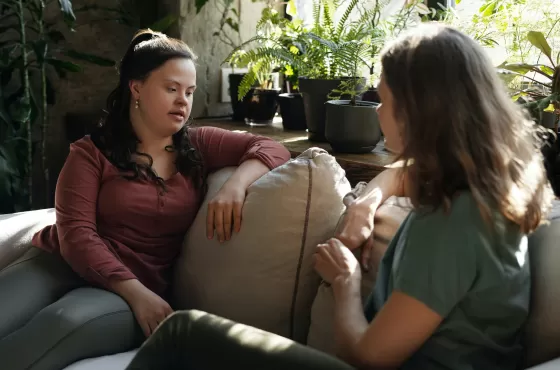
This blog was written with support from national for-purpose disability organisation Siblings Australia.
Becoming a nominee with regard to an NDIS Plan for your brother or sister with disability can be a different experience for everyone. In this blog, Natalie from Siblings Australia shares her experience…
My brother has an intellectual disability and has required additional supports throughout his life. That has left him vulnerable, with supports not always being reliable, and we have had to ‘rescue’ him on a couple of occasions from those who were taking advantage of him. It involved him moving closer to us, his family, which meant that he would have more supports (both family and friends) but that we could also help him implement some additional supports and community participation outside of his immediate family.
To ensure he wasn’t in a vulnerable situation again and to begin to build up his assets (both financial and physical), a Guardianship and Administration order was granted through The South Australian Civil and Administrative Tribunal (SACAT), with our Mum, sister and I to act as Guardians and Administrators. Whilst this means that decisions can be made by us, they are always made with my brother and not for him. We see the orders as a safeguard, and we need to adhere to quite rigorous reporting requirements (outlined by The Public Trustee), which further ensure that we are acting in my brother’s best interests.
My brother lives independently, close to family, and receives support from the family to undertake things like shopping, money management, planning and going on holidays etc. He has an appointed support worker who undertakes community participation with him. He has a NDIS Plan, which allows for the appointment of a nominee/s, in this case my mother and I, who can support him with choices and decisions made regarding his Plan. As an aside, whilst not for everyone, the Admininstration orders mentioned above made it easier for us to be appointed as nominee/s. So, if you already have these in place, let the NDIS know about them.
The NDIS is clear that for adults (those aged 18+), participants have the right to make decisions about their business with the NDIS. Initial communications between the NDIS and a participant start from the principle that a participant can make their own decisions that affect their life, either independently or with supported decision making. A great video on supportive decision making can be found here.
If a person is not able to make decisions, even with support, the NDIS will explore who else can make decisions and do things on their behalf. This is known as representative decision-making, and the appointed person is called a nominee. The role of a nominee is voluntary, which means they don’t get paid and there are two different kinds of nominee, a plan nominee or correspondence nominee (both can be appointed, depending on individual needs).
Essentially a plan nominee is someone appointed who can make decisions in consultation with the participant, about the preparation, management or changes to a plan and manages funding for the plan. A correspondence nominee can make some decisions about a participant’s business with the NDIS, but this does not include those decisions made in preparing or changing a plan, managing the funding supports of a plan or decisions made by an appointed plan nominee. Participant communications are sent to a correspondence nominee and the NDIS will tell a correspondence nominee when they contact the participant directly. An example of how each nominee scenario may work follows:
Plan nominee: Megan is 34 and lives in Supported Independent Living (SIL). Megan has cerebral palsy and needs support to make decisions about her health or lifestyle. Megan’s Mother, Sarah and Father, Stewart are her appointed Guardians, Administrators and Plan Nominees. When Megan’s plan was recently due for review, Sarah and Stewart had lots of conversations with Megan, over time, about different aspects of her life, such as where she lives, her social and recreational activities and her goals regarding employment. Sarah and Stewart documented this information and shared with the Local Area Coordinator (LAC) to incorporate any changes or goals into her plan.
Correspondence nominee: John is 69 and lives with a vision impairment. He lives with his partner Sue and assistance dog Shelby. John is able to make all of his own decisions, however due to his vision impairment, he does not feel that he’s always “on-top of” important communications about his NDIS plan. John has therefore appointed Sue as his correspondence nominee. Sue receives all documentation relating to John’s NDIS plan and communicates this with him either verbally or ensures John has access to an audio version of the communication. From time-to-time Sue has emailed the NDIS on John’s behalf to make enquiries about his plan, but any changes are authorised by John only.
Almost six years in, we are still riding the wave of the NDIS journey, to ensure that my brother has the right supports now and into the future (easier said than done…but that’s perhaps the topic of another blog). We are grateful for the ability to act as his nominee and try to ensure the best possible outcomes for him.
Siblings Australia is a national for-purpose organisation and is your go-to for programs and supports for siblings of people with disabilities. The sibling relationship can be one of life’s longest and supporting that relationship is at the core of what they do. Siblings Australia help to maximise the well-being of siblings and build their capacity to navigate life’s journey as the sibling of a person with disability.
Resources:
